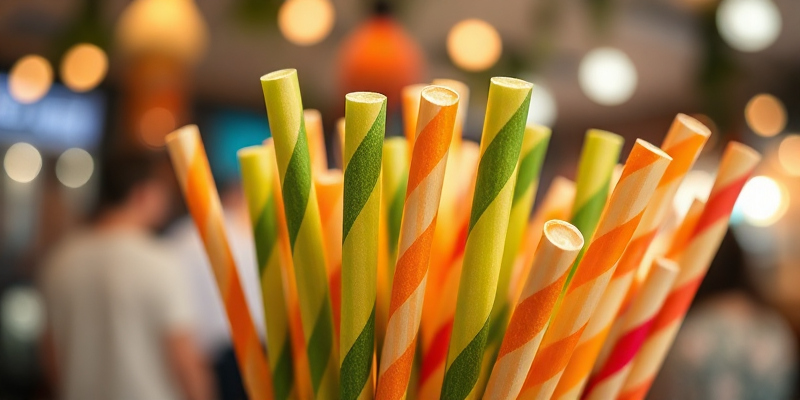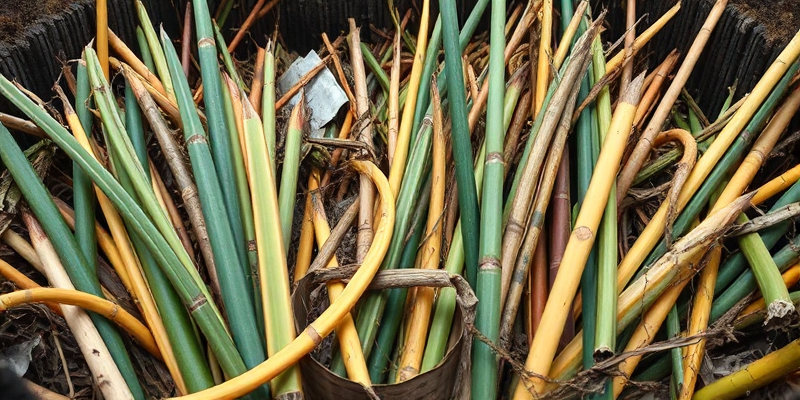Sugarcane vs. Eco-Straws: FDA & Certificado LFGB

The global fight against plastic pollution is intensifying. Governments worldwide are implementing stricter regulations and imposing hefty fines for non-compliance, driving businesses to seek sustainable alternatives. Plastic straws, once ubiquitous, are increasingly under scrutiny. The environmental impact is undeniable: an estimated 8.3 billion plastic straws pollute our oceans annually. This necessitates a shift towards eco-friendly options, and sugarcane straws are emerging as a compelling solution. Unlike their plastic counterparts, sugarcane straws offer a biodegradable, compostable, and aesthetically pleasing alternative that aligns with growing consumer demand for sustainability. NatureBioEco provides high-quality, customizable sugarcane straws, certified by the FDA and LFGB, ensuring both safety and environmental responsibility for your business. This blog post will delve into the advantages of sugarcane straws, comparing them to other eco-friendly options and highlighting their benefits for businesses striving for sustainable practices.
Regulatory Compliance: FDA & LFGB Certifications

Navigating the complex landscape of food safety regulations is crucial for businesses. Failure to comply can result in significant financial penalties – the average fine for FDA violations related to food packaging can exceed $100,000. To alleviate these concerns, NatureBioEco’s sugarcane straws boast both FDA (Food and Drug Administration) and LFGB (German Federal Ministry of Food and Agriculture) certifications. These certifications confirm our straws meet stringent safety standards for food contact, guaranteeing the absence of harmful chemicals and ensuring product safety for your customers. Palhinhas de Cana Our rigorous testing procedures ensure compliance, providing peace of mind and a competitive edge in the market. This adherence to international standards underscores our commitment to quality and responsible manufacturing.
Sugarcane Straws vs. Other Eco Alternatives

While paper and bamboo straws are also presented as eco-friendly alternatives, sugarcane straws offer distinct advantages. Paper straws, for instance, often require plastic liners for structural integrity, undermining their eco-credentials. They also tend to become soggy quickly, diminishing the consumer experience. Bamboo straws, although durable, can be difficult to clean and may present challenges in terms of sourcing and ethical production. Bamboo Cutlery Sugarcane straws, on the other hand, provide a superior alternative.
| Feature | Palhinhas de Cana | Canudos de papel | Canudos de Bambu |
|---|---|---|---|
| Biodegradabilidade | Excellent | Fair (with caveats) | Bom |
| Compostabilidade | Excellent | Limitado | Bom |
| Durabilidade | Bom | Poor | Excellent |
| Cost | Competitive | Competitive | More Expensive |
| Aesthetics | Appealing | Less Appealing | Appealing |
Choosing sugarcane straws minimizes environmental impact while maintaining consumer satisfaction.
Key Business Benefits of Sugarcane Straws

Beyond their environmental credentials, sugarcane straws offer several key business advantages. Firstly, they enhance your brand image. Consumers are increasingly conscious of environmental issues, and choosing sustainable alternatives demonstrates corporate social responsibility, attracting environmentally conscious customers. Secondly, sugarcane straws offer customization options. NatureBioEco allows for branding with your logo and custom colors, enhancing brand visibility and creating a memorable experience. Customizable Packaging Thirdly, the production process of sugarcane is highly efficient, resulting in a competitive price point compared to other eco-friendly alternatives. Finally, the reduction in plastic waste contributes to positive public relations, further enhancing brand reputation. Bagasse Products
Environmental Impact of Sugarcane Straws
Sugarcane is a rapidly renewable resource, requiring minimal land and water compared to other crops. Its cultivation sequesters carbon dioxide, contributing to climate change mitigation. The production of sugarcane straws generates significantly less greenhouse gas emissions compared to plastic straws. Studies have shown a CO2 reduction of up to 80% depending on the manufacturing process and transportation. Home Compostable Products Furthermore, their complete biodegradability eliminates the persistent pollution associated with plastic straws. The UNEP’s report on plastic alternatives highlights the urgency for such sustainable shifts. Plastic Alternatives Report Finally, choosing sugarcane straws actively supports sustainable agriculture and reduces reliance on non-renewable resources.
Case Study: Sustainability Success
A leading café chain in Europe switched to NatureBioEco sugarcane straws, resulting in a 75% reduction in their plastic waste within the first year. This positive change significantly enhanced their brand image, attracting environmentally conscious customers and boosting sales. Their commitment to sustainability became a powerful marketing tool, setting them apart from competitors. Estudos de caso This case study exemplifies the significant business benefits associated with adopting eco-friendly practices and choosing sustainable products like sugarcane straws.
FAQ: Sugarcane Straws Answered
- Q1: Are sugarcane straws truly compostable? A1: Yes, our sugarcane straws are home compostable under the right conditions – warm temperatures, sufficient moisture, and adequate aeration.
- Q2: How long do sugarcane straws take to decompose? A2: Under ideal composting conditions, they can decompose within 4-6 weeks.
- Q3: Are sugarcane straws safe for hot beverages? A3: Yes, our straws are heat-resistant up to 80°C (176°F).
- Q4: Are sugarcane straws recyclable? A4: While compostable, they can also be disposed of with other compostable materials.
- Q5: What are the dimensions and specifications available? A5: We offer various sizes and lengths; please contact us for detailed specifications.
- Q6: What is the minimum order quantity (MOQ)? A6: Our MOQ varies depending on the customization. Contact us for details.
- Q7: How can I get a sample? A7: Contact our sales team, and we will gladly arrange a sample shipment. Contate-nos
Conclusão
The transition to sustainable alternatives is not just an environmental imperative; it’s a smart business strategy. Sugarcane straws, with their FDA and LFGB certifications, offer a superior eco-friendly option compared to paper and bamboo straws, combining sustainability with practicality and aesthetic appeal. From enhanced brand reputation to reduced waste and cost-effectiveness, the benefits are compelling. NatureBioEco’s commitment to quality, customization, and sustainability ensures you can confidently make the switch. Ready to embrace a greener future for your business? Contact NatureBioEco today for a customized B2B quote and experience the difference. Let’s discuss your specific needs and explore the possibilities! FDA Food Ingredients & Packaging







